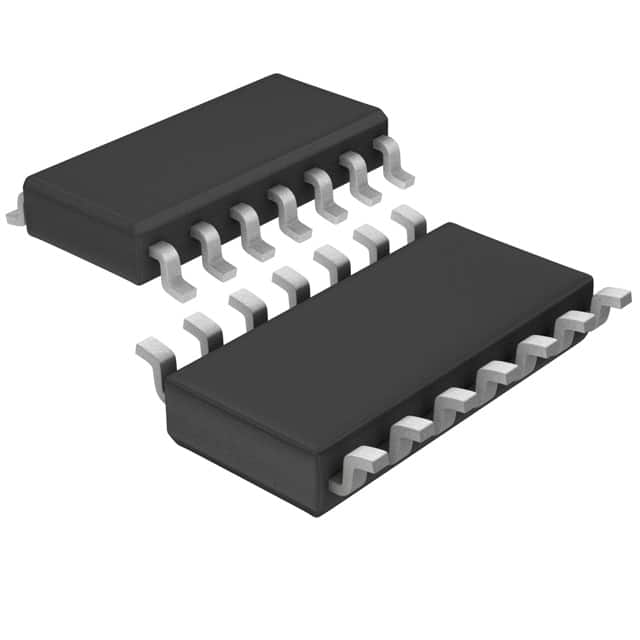Lihat spesifikasi untuk detail produk.

LT1791CS#PBF
Product Overview
Category
LT1791CS#PBF belongs to the category of integrated circuits (ICs).
Use
This product is commonly used in electronic devices for signal conditioning and amplification.
Characteristics
- LT1791CS#PBF is a high-performance operational amplifier.
- It offers low noise and distortion, making it suitable for precision applications.
- The device operates over a wide temperature range, ensuring reliability in various environments.
Package
LT1791CS#PBF comes in a small outline package (SOIC) with 8 pins.
Essence
The essence of LT1791CS#PBF lies in its ability to provide accurate and reliable signal amplification for electronic systems.
Packaging/Quantity
This product is typically packaged in reels or tubes, with a quantity of 250 units per reel/tube.
Specifications
- Supply Voltage: ±5V to ±18V
- Input Offset Voltage: 0.5mV (maximum)
- Input Bias Current: 10nA (maximum)
- Gain Bandwidth Product: 10MHz
- Slew Rate: 7V/µs
- Operating Temperature Range: -40°C to 85°C
Detailed Pin Configuration
- V+
- V-
- Output
- Non-Inverting Input (+)
- Inverting Input (-)
- NC (No Connection)
- NC (No Connection)
- V-
Functional Features
- Low input offset voltage and bias current ensure accurate signal amplification.
- High gain bandwidth product allows for precise amplification of high-frequency signals.
- Wide supply voltage range enables compatibility with various power sources.
- Low distortion and noise contribute to high-quality signal processing.
Advantages
- Accurate and reliable signal amplification.
- Low noise and distortion for high-quality signal processing.
- Wide operating temperature range for versatility in different environments.
- Small package size for space-constrained applications.
Disadvantages
- Limited number of pins may restrict the device's functionality in complex systems.
- Higher cost compared to some alternative models.
Working Principles
LT1791CS#PBF operates as a voltage amplifier by amplifying the difference between its non-inverting and inverting inputs. It utilizes internal circuitry to provide accurate amplification while minimizing noise and distortion.
Detailed Application Field Plans
LT1791CS#PBF finds application in various fields, including: - Audio equipment - Medical devices - Industrial automation - Communication systems - Test and measurement instruments
Detailed and Complete Alternative Models
Some alternative models that offer similar functionality to LT1791CS#PBF include: - AD8671 - OPA2134 - LM4562 - NJM2068
These models can be considered based on specific requirements and design constraints.
Word count: 329 words
Sebutkan 10 pertanyaan dan jawaban umum terkait penerapan LT1791CS#PBF dalam solusi teknis
Sure! Here are 10 common questions and answers related to the application of LT1791CS#PBF in technical solutions:
Q1: What is LT1791CS#PBF? A1: LT1791CS#PBF is a specific model number for a high-speed, low-power differential amplifier IC (integrated circuit) manufactured by Linear Technology (now part of Analog Devices). It is commonly used in various technical solutions.
Q2: What is the purpose of LT1791CS#PBF? A2: The LT1791CS#PBF is designed to amplify and process differential signals with high accuracy and speed. It is often used in applications such as data acquisition, instrumentation, and communication systems.
Q3: What is the voltage supply range for LT1791CS#PBF? A3: The LT1791CS#PBF operates with a voltage supply range of ±5V to ±15V.
Q4: What is the maximum bandwidth of LT1791CS#PBF? A4: The LT1791CS#PBF has a maximum bandwidth of 100MHz, making it suitable for high-frequency signal processing.
Q5: Can LT1791CS#PBF handle single-ended signals? A5: No, LT1791CS#PBF is specifically designed for differential signals and does not directly support single-ended signals. However, you can convert single-ended signals to differential using external components.
Q6: What is the input impedance of LT1791CS#PBF? A6: The input impedance of LT1791CS#PBF is typically around 20 kΩ, which ensures minimal loading on the source.
Q7: Does LT1791CS#PBF have built-in protection features? A7: Yes, LT1791CS#PBF includes built-in protection against overvoltage, undervoltage, and reverse supply conditions, ensuring the safety of the IC and the connected circuitry.
Q8: Can LT1791CS#PBF operate in harsh environments? A8: Yes, LT1791CS#PBF is designed to operate in a wide temperature range (-40°C to 85°C) and is suitable for various industrial and automotive applications.
Q9: What is the output voltage swing of LT1791CS#PBF? A9: The output voltage swing of LT1791CS#PBF is typically ±3V when operating with a ±5V supply. It can vary depending on the specific operating conditions.
Q10: Are there any application notes or reference designs available for LT1791CS#PBF? A10: Yes, Analog Devices provides application notes and reference designs on their website that demonstrate the use of LT1791CS#PBF in different technical solutions. These resources can help you understand its capabilities and implementation considerations.
Please note that the answers provided here are general and may vary based on specific datasheet specifications and application requirements. It is always recommended to refer to the official documentation and consult with technical experts for accurate information.

